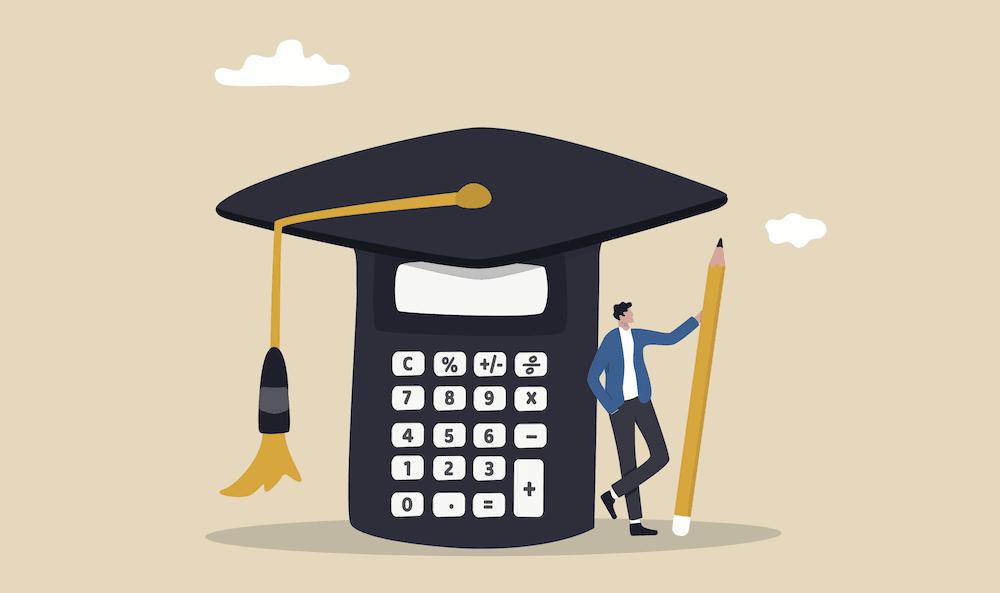Should you pay off loans before buying a house? | How student loans impact your credit score | Mortgage approval with student debt | Debt-to-income ratio | 5 steps for buying a house with $100K in student loans
More than 42 million Americans currently have federal student loans — adding up to $1.7 billion of U.S. debt. Although the average student loan debt is around $28,400, some Americans have accumulated much more. Multiple degrees and spiraling interest paymentscan quickly drive debt up to $100,000 — or more.
For many Americans, student debt is an obstacle to homeownership. In a survey of 1,000 undergraduate students, our friends at the Clever Data Center found that undergraduates with student debt are pushing back plans for homeownership by seven years.
However, buying a house with $100,000 in student loans (or more!) is possible.
To take the first steps toward homeownership, you’ll need to understand how your student loans impact your credit score and eligibility for a mortgage. From there, you can follow five steps to get you closer to owning your dream home.
Do You Have to Pay Off Student Loans Before Getting A Mortgage?
The simple answer is no — you don’t have to pay off your student loans before getting a mortgage.
In 2017, Fannie Mae changed how it looks at student loan debt. If your loans are deferred or in forbearance, you can qualify by paying just 1% of your total balance. Borrowers who are on an income-driven repayment plan can also use their actual monthly payments to qualify for a mortgage.
The bottom line: Most financial situations can handle student loans and mortgage debt at the same time, thanks in part to these new guidelines.
Still, the idea of taking on more debt is daunting to many Americans. Nearly half of college students who have student loan debt (48%) plan to delay homeownership, according to a recent survey of 1,000 undergraduates by our friends at the Clever Data Center.
Do Student Loans Affect Your Credit Score?
Yes — unfortunately, student loans do affect your credit score.
Your credit report includes your student loan balance and payment history, according to the Consumer Financial Protection Bureau (CFPB). Building a good credit history is important, as it can help you qualify for a mortgage with lower interest rates.
In general, late or missing payments can tank your credit score, while keeping up with your payments can give your credit score a boost.
Can You Get Approved For A Mortgage With Student Loans?
Yes — the good news is you don’t have to be debt-free to buy a house. You can still get approved for a home loan, even if you have $100,000 (or more!) in student loans.
But your approval hinges on more than the type of debt you have. Before approving your mortgage application, lenders also look at your debt-to-income (DTI).
What’s Debt-To-Income Ratio?
Your DTI is a number that shows how much of your monthly income goes to debt payments. Generally, you’ll need to have a DTI below 43% to qualify for a mortgage loan, according to the CFPB.
A high DTI indicates that a significant chunk of your income goes to paying debt each month.
Lenders generally label people as high-risk when they have a high DTI, which could impact whether or not your home loan is approved.
A low DTI means less of your income goes toward debt, leaving you with more wiggle room in your monthly expenses.
For example, if your DTI is 36%, then $0.36 out of every dollar you earn goes to pay debt — leaving $0.64 of each dollar to cover everything else.
How DTI Works, By the Numbers 🔢 |
|---|
| Let’s say you have $100,000 in student loans. The average student loan payment is $460 — but you also have a car payment of $636 per month.
If your monthly income is $4,800 (based on the U.S. median household income), your DTI is 23%. That’s well below the recommended limit of 43%! But suppose you also have two credit card payments that total $210 each month, a second car payment of $600 per month, and a monthly layaway payment for your television for $110. In that case, your DTI would be 42%, putting you right on the edge of the maximum that lenders typically allow. |
5 Steps To Buying A House With $100K in Student Loans
Student loan debt can feel like a major obstacle to buying a home. In a survey of 1,000 undergraduate students, our friends at the Clever Data Center found that 53% of millennials expected to become homeowners between 26 and 36 — but only 37% actually achieved this milestone.
Don’t get discouraged! You just need to know where to look, what to look for, and how to weigh your options.
Step 1: Check Your Credit Report
Before you shop for houses, check your credit report. Review it for errors and get it corrected if necessary.
Then take a look at your credit score and DTI. Remember that lenders can reject applications if you have a low credit score or a high DTI.
Step 2: Get Pre-Approval From A Lender
Before you start house hunting, get pre-approved for a mortgage, which means your lender determined you qualify for a loan up to a certain amount. You can then shop for homes with confidence, knowing that there will be no surprises when applying for financing.
Step 3: Consider Flexible Mortgage Programs
Some mortgage programs have more flexible requirements. For example, an FHA loan could qualify you with a DTI up to 56.9%, and a VA loan can get you into a house without a down payment. Just know you might be on the hook for extra mortgage insurance.
Step 4: Look At Lower-Priced Houses
If you’re buying a house with $100,000 in student loan debt, a lower-priced property can mean a more affordable monthly mortgage payment. You might explore nearby cities, give up some amenities, or look at a fixer-upper to lower your purchase price.
Step 5: Work With A Buyer’s Agent
A buyer’s agent can increase your chances of finding a house you love in your price range. And in a competitive housing market, a buyer’s agent can usually get you in to see a new listing more quickly than if you’re house-hunting on your own.
Plus, working with a real estate agent won’t cost you anything extra — the seller covers all realtor commissions.
Recommended Reading
FAQs
Do student loans affect buying a house?
Student loans can affect your credit score and your debt-to-income ratio — two factors lenders use while deciding whether you qualify for a mortgage. You don’t have to be debt-free to buy a house, but late payments or other forms of debt could impact your ability to secure a mortgage.
Can you buy a house with student loan debt?
The simple answer is yes — you can buy a home with student loan debt. But to qualify for a mortgage, you’ll generally need to have a good credit score and a debt-to-income ratio below 43%. Learn how student loan debt might impact your homeownership goals.



